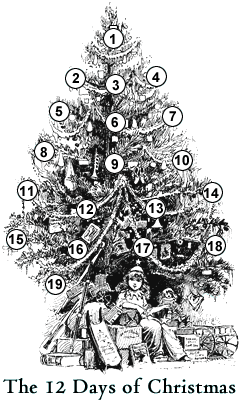Patristic Lectionary
Saint Augustine of Hippo – The Doctor of Grace http://tomperna.org/2013/08/28/saint-augustine-of-hippo-the-doctor-of-grace/
In his Wednesday Audience from January 9, 2008, Pope Emeritus Benedict XVI said,
“This man of passion and faith, of the highest intelligence and tireless in his pastoral care, a great saint and Doctor of the Church, is often known, at least by hearsay, eve by those who ignore Christianity or who are not familiar with it, because he left a very deep mark on the cultural life of the West and on the whole world. Because of his special importance, Saint Augustine’s influence was widespread.”
2014/01/09
2nd reading, Wednesday of the 1st Week in Ordinary Time Year II
A READING FROM ON REBUKE AND GRACE BY ST AUGUSTINE
The Lord of all things created all things very good, he foreknew that evils would arise from good, and he knew that it pertains to his omnipotent goodness to make good use of evils rather than not to allow evils to exist. He made man with free choice and, though ignorant of his future fall, man was still happy because he knew that it was in his power both not to die and not to become miserable. If through free choice he had willed to remain in this upright state without defect, he would, without any experience of death and unhappiness, certainly have received that fullness of beatitude enjoyed by the holy angels. But because Adam abandoned God through free choice, he experienced the just judgement of God to the point that he was condemned along with all his offspring which in its entirety had sinned in him and along with him.
The Lord of all things created all things very good, he foreknew that evils would arise from good, and he knew that it pertains to his omnipotent goodness to make good use of evils rather than not to allow evils to exist. He made man with free choice and, though ignorant of his future fall, man was still happy because he knew that it was in his power both not to die and not to become miserable. If through free choice he had willed to remain in this upright state without defect, he would, without any experience of death and unhappiness, certainly have received that fullness of beatitude enjoyed by the holy angels. But because Adam abandoned God through free choice, he experienced the just judgement of God to the point that he was condemned along with all his offspring which in its entirety had sinned in him and along with him.
What then? Did Adam not have the grace of God? On the contrary, he had a great grace, but a different grace from ours. He existed amid goods which he had received from the goodness of his Creator, but in this life the Saints who have the grace of deliverance exist amid the evils from which they cry out to God, Deliver us from evil. In those goods Adam did not need the death of Christ, whereas the blood of that Lamb washes these Saints from inherited and personal sin. For in them the flesh has desires opposed to the spirit and the spirit has desires opposed to the flesh, and in this struggle they ask that the grace of Christ give them the power to fight and to conquer. What grace is more powerful than the only-begotten Son of God, equal to and coeternal with the Father, who became man for them and, without any sin of his own, either original or personal, was crucified by human sinners? God, therefore, assumed our nature, that is, the rational soul and the flesh of Christ the man, and he assumed it in a singularly marvellous manner. For, without any preceding merits of his own righteousness, Christ was the Son of God from the first moment he began to be a man in such a way that he and the Word, which is without beginning, was one person. Good works followed his birth; good works did not merit it. For there was no reason to fear that the human nature assumed in this ineffable way into the unity of the person by God the Word would sin by free choice of the will.
The first man did not have this grace with which he would never have willed to be evil, but even in his free choice God did not leave Adam without grace. For free choice is sufficient for evil, but not sufficient for good, unless it is helped by the Omnipotent Good. But that man abandoned this help through free choice, he abandoned it and was in turn abandoned. This is the first grace which was given to the first Adam, but there is a more powerful grace than this in the second Adam. For the first grace brought it about that the man had righteousness if he willed to; but the second even makes one to will, and to will so strongly and to love with such ardour that by the will of the Spirit one conquers the contrary desires of the flesh.
St Augustine, On Rebuke and Grace, 27-31; WSA (1999) tr. Teske.
WEDNESDAY, 1ST WEEK OF ORDINARY TIME, YEAR II
A READING FROM THE BOOK OF GENESIS
(The sin of Adam: Genesis 3:1-24)
Now the serpent was more subtle than any other wild creature that the LORD God had made. He said to the woman, “Did God say, ‘You shall not eat of any tree of the garden’?” ...
(The sin of Adam: Genesis 3:1-24)
Now the serpent was more subtle than any other wild creature that the LORD God had made. He said to the woman, “Did God say, ‘You shall not eat of any tree of the garden’?” ...

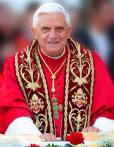

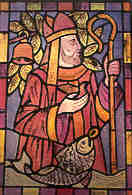
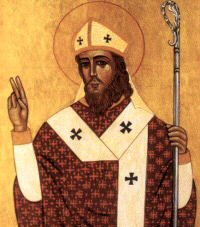







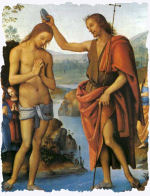 Today we celebrate the baptism of Christ in the Jordan. This is the second epiphany, or manifestation, of the Lord. The past, the present, and the future are made manifest in this epiphany.
Today we celebrate the baptism of Christ in the Jordan. This is the second epiphany, or manifestation, of the Lord. The past, the present, and the future are made manifest in this epiphany.